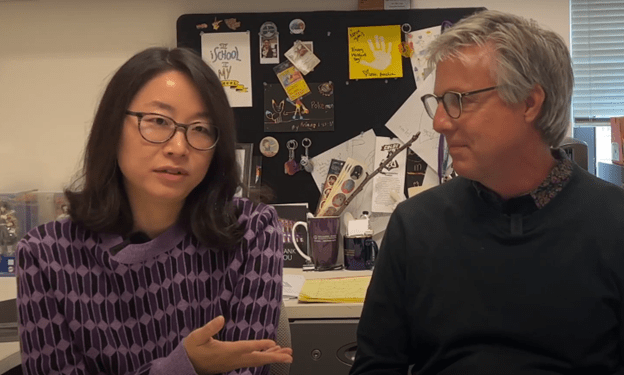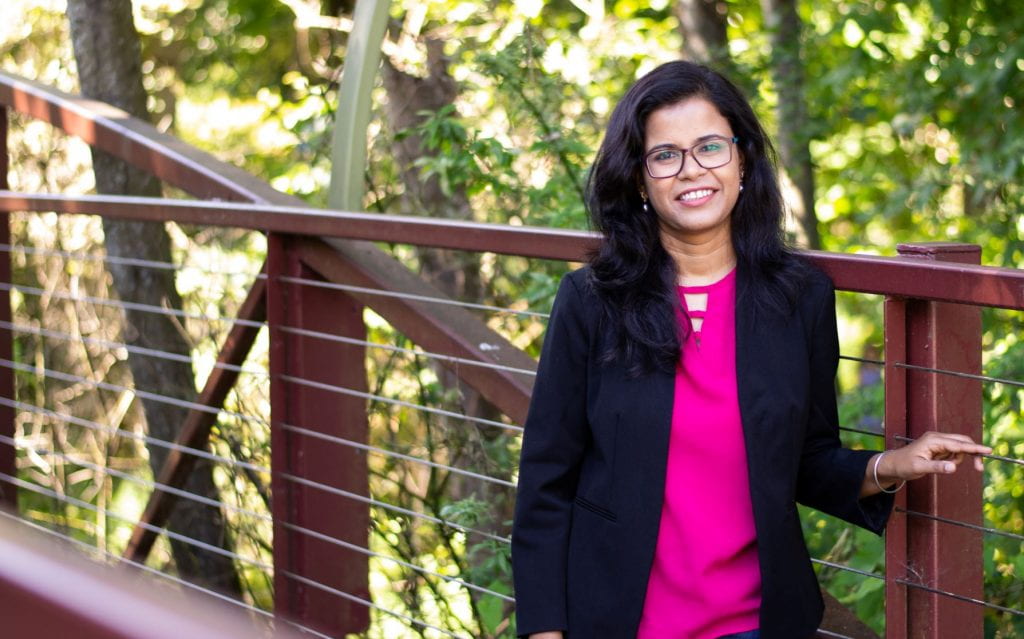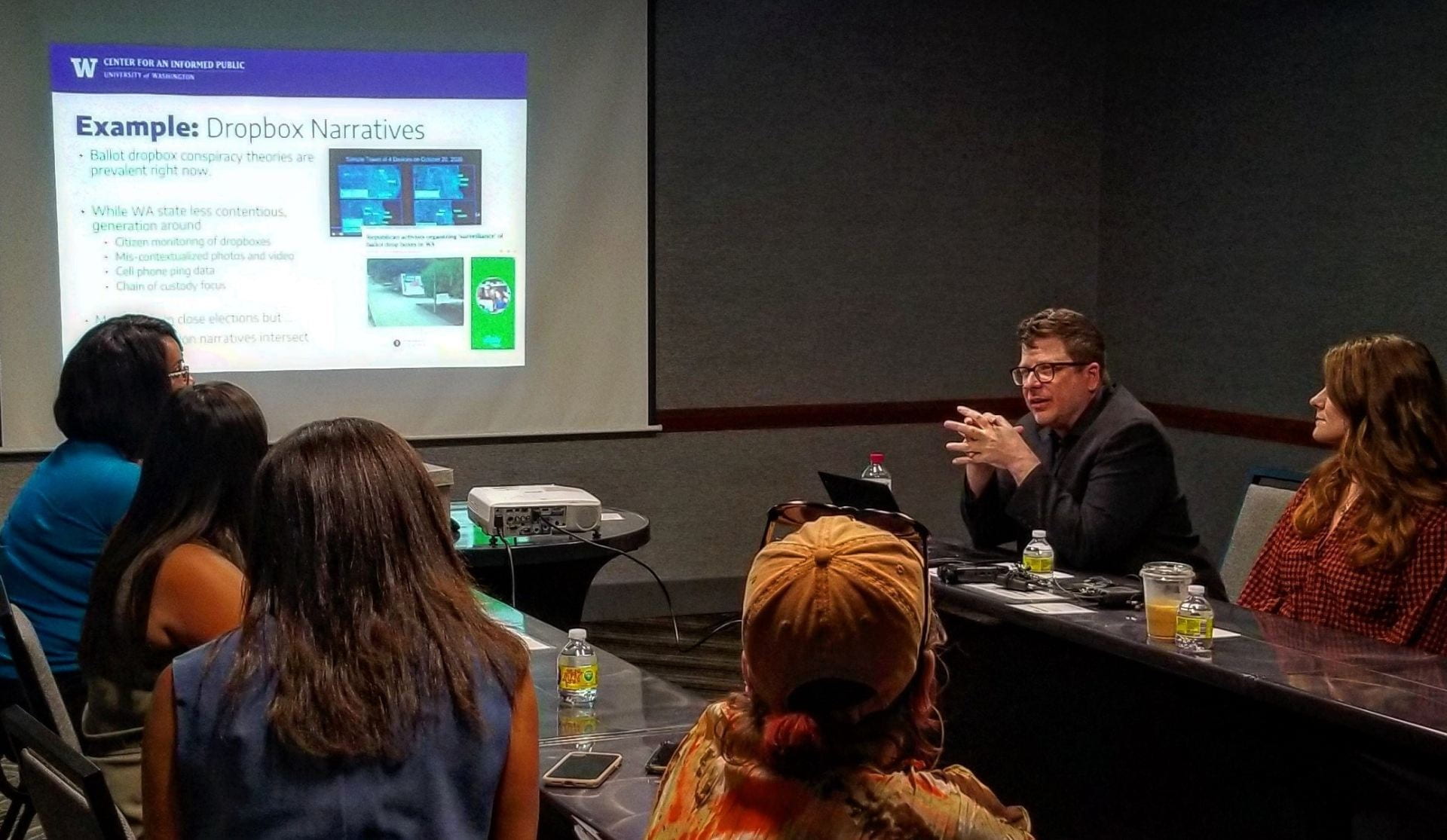This is the web version of the July 2022 edition of the Center for an Informed Public‘s News & Insights newsletter that was originally sent out on July 29, 2022.
CIP researchers join WA Secretary of State for media roundtable on election misinformation
University of Washington Center for an Informed Public research scientist Mike Caulfield and postdoctoral scholar Rachel E. Moran joined Washington Secretary of State Steve Hobbs on July 21 for a media roundtable discussion in Seattle to discuss election misinformation. Caulfield and Moran shared a presentation about work CIP researchers are involved with tracking the full life-cycle of election rumors and misinformation, including insights around current narratives, such as those around ballot drop boxes.
NEWS: CIP’s WA Poll shows high trust in elections among Washingtonians.
JOBS: CIP seeks Software Engineer, Education & Engagement Manager.

With the Euphorigen Investigation, break free from misinformation in an escape room
In June, the Center for an Informed Public, in partnership with the UW iSchool’s Technology & Social Change Group and the GAMER Research Group, and Puzzle Break, officially launched the Euphorigen Investigation, a game that improves people’s awareness of misinformation technologies and techniques, such as misleading data, deepfake images and videos, and social media bots, while generating reflection on particular emotions and cognitive biases, such as vulnerability, confirmation bias, and the consequences of unwittingly sharing misinformation. The development of the misinformation escape room game was led by CIP co-founder Chris Coward, an iSchool senior principal research scientist and TASCHA director, and CIP faculty member Jin Ha Lee, an iSchool assistant professor.
- READ MORE | WebJunction backgrounder on the Euphorigen Investigation
- ALSO | How organizations outside the U.S. are utilizing the game
- WATCH | 4-minute video: Break free of misinformation in an escape room
As students teach their parents at MisinfoNight, Ballard High School expands info literacy curriculum into ‘true community capacity’
Approximately 300 students at Ballard High School in Seattle, joined by their teachers and parents, gathered for MisinfoNight on June 9, the culmination of student project work where they end up teaching adults valuable skills for fact-checking, contextualizing claims and tracing sources of information online. The event, inspired by the annual MisinfoDay educational program co-presented by the University of Washington’s Center for an Informed Public and Washington State University’s Edward R. Murrow College of Communication, featured introductory remarks from CIP research scientist and digital literacy expert Mike Caulfield.
- Learn more about Ballard High School’s MisinfoNight
- GeekWire: “High school students in Seattle educate community on how to identify and combat misinformation“
WEBINAR: CIP’s Maddy Jalbert, Rachel E. Moran present Metropolitan New York Library Council Info Lit 101 lessons on mis- and disinformation.
RESEARCH NOTES

‘Pathways through conspiracy: The evolution of conspiracy radicalization through engagement in online conspiracy discussions’ awarded ICWSM best paper
The International Conference on Web and Social Media (ICWSM) awarded UW Information School doctoral candidate Shruti Phadke, iSchool assistant professor and CIP faculty member Tanu Mitra (pictured above), along with co-author Mattia Samory (GESIS), the best paper award at the leading international conference of research on online social media’s 2022 conference in June. The paper, “Pathways through conspiracy: The evolution of conspiracy radicalization through engagement in online conspiracy discussions,” provides empirical modeling of various radicalization phases in online conspiracy theory discussion participants; studying 36,000 Reddit users through 169 million contributions, the co-authors uncover four distinct pathways of conspiracy engagement. In announcing the best paper award, ICWSM conference organizers said: “This [paper] shines a light on an important yet under-attended aspect of the radicalization problem. In doing so, they lay the foundation for more work and attention on this aspect of an important and timely social issue.”
***
READ MORE ABOUT RECENT PUBLICATIONS from CIP-affiliated researchers and other research news in CIP Research Notes, including: “Combining interventions to reduce the spread of viral misinformation” in Nature Human Behaviour; “Repeat spreaders and election delegitimization: A comprehensive dataset of misinformation tweets from the 2020 U.S. election,” in the Journal of Quantitative Description: Digital Media; “Designing trust: Design style, political ideology, and trust in ‘fake’ news websites” in Digital Journalism; among others.
WEBINAR: CIP’s Maddy Jalbert, Kate Starbird discuss ‘why we fall for misinformation’
POLICY NOTES
CIP research cited in FTC’s ‘Combatting online harms through innovation’ report to Congress
A Federal Trade Commission report submitted in June to Congress, “Combatting online harms through innovation,” cites work from CIP co-founder and UW School of Law professor Ryan Calo, who also serves as faculty co-director of the UW Tech Policy Lab; and an October 2020 CIP white paper about deepfake technology co-authored by iSchool doctoral student Stephen Prochaska, CIP assistant director for communications Michael Grass, and CIP co-founder and iSchool associate professor Jevin D. West, that featured key ideas and highlights from a series of three virtual workshops co-hosted by the CIP and Microsoft’s Defending Democracy Program.
***
CIP director Kate Starbird, a UW Human-Centered Design & Engineering associate professor, was interviewed by Evelyn Douek and Quinta Jurecic on the Lawfare podcast’s Arbiters of Truth series to discuss CIP research into mis- and disinformation from the 2020 U.S. elections, the ongoing hearings by the U.S. House Select Committee to Investigate the January 6 Attack on the U.S. Capitol, and a recent paper from a team of CIP-led researchers, “Repeat spreaders and election delegitimization: A comprehensive dataset of misinformation tweets from the 2020 U.S. election,” published in June in the Journal of Quantitative Description: Digital Media.
***
CIP faculty member Tanu Mitra, a UW iSchool assistant professor, has been named by Spotify as a member of the company’s new Safety Advisory Committee, an external body that will study ways Spotify can make “better decisions about content moderation and more generally forming new policies related to that,” according to TechCrunch.
CIP IN THE NEWS
MIT Tech Review interviews CIP’s Rachel E. Moran about Facebook ads that share medical misinformation
***
See complete news coverage featuring the Center for an Informed Public, its research and researchers from May, June and July, including articles, interviews and other attention from The New York Times, The Washington Post, Grid News, PolitiFact, CNET, Tech Policy Press, The Seattle Times, GeekWire and KING 5 TV, among other news organizations.



